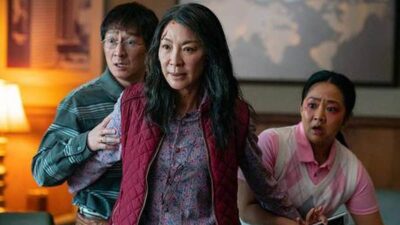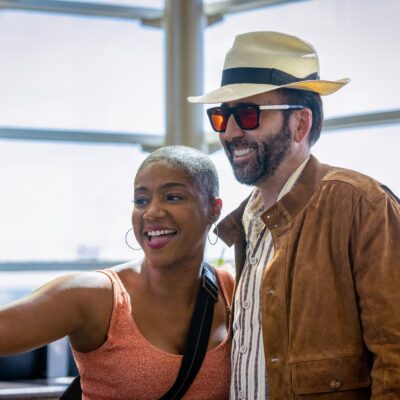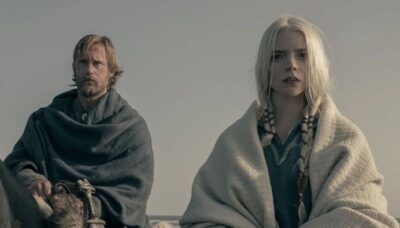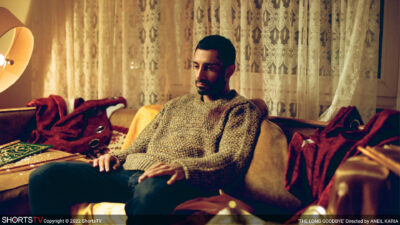From the Post: “Are you sick of comic book movies and other franchises? This month, you actually have a chance to do something about it. A trio of big, original new releases comes to theaters this month. Go see one — or all of them. If these movies fail, our theatrical future will be nothing but the disappointing Morbius and its ilk. And movie lovers who have defaulted to home entertainment even after coronavirus vaccines, rapid tests and high-quality masks have become widely available will have only themselves to blame.
Laemmle Oscar Contest, plus Kevin Costner’s Best Director Oscar Presentation.
Welp, that’s a wrap for the 2022 Oscars and our contest. Laemmle moviegoers were able to foresee the Academy’s choices very accurately with two exceptions: they went for the more conventional Best Picture nominee with CODA over The Power of the Dog and the artier choice with Best Animated Short nominee Windshield Wiper over the family-friendly Robin Robin. The Power of the Dog was in a tight race for Best Adapted Screenplay with eventual winner CODA. Best Original Screenplay split somewhat evenly between Paul Thomas Anderson for Licorice Pizza and eventual winner Kenneth Branagh for Belfast.
See the full results in cool pie charts at laemmle.com/oscars. We’ll announce our winners on this page on Thursday, March 31.
The sad, shocking incident during the ceremony overshadowed everything but one thing worth taking a second look at is Kevin Costner‘s presentation of the Best Director Oscar. It was probably the best presentation of the evening. He has won the award himself, of course, 30 years ago for Dances with Wolves. He spoke movingly and deliberately about the experience of seeing movies in theaters and how seeing How the West was Won at the Cinerama Dome inspired him to become an actor and filmmaker. The in-person audience giggles at first, but by the end you could hear a pin drop. Here’s a transcription and video:
You know, about a half-mile from here, I saw my first full-length adult movie. I know what you’re thinking, but I was seven years old and I was away from my parents and wanted to have some fun. It was a cowboy movie called How the West Was Won. And what I witnessed that afternoon in the Cinerama Dome was perfect. The curtain, when we still had them, opened to a film almost four hours long. It had an intermission where the score continued, subtly signaling at one point that the second half was about to start. I don’t know where everyone went, but I wasn’t going to move an inch. I decided that I would not give up my magic seat. I was determined that I would not miss a minute. And as I sat in that dark that afternoon 60 years ago, all I really knew was that I was in careful hands. Little did I know that three directors would be responsible for that epic moment in my life. They fired my imagination, and they captured my heart. That’s what can happen when you direct a movie. You can change a mind. You can change the trajectory of a life, of a career. You can capture a heart. But you can’t do it alone. And directors, tonight’s directors all know the possibilities. They know what’s at stake. It’s why they give their precious time. It’s why they choose to fight through the long days, and the longer nights, and the endless questions, and the inevitable second guessing that comes from those who would do it differently if given half a chance. These five directors have all managed to stay the course. They have all held the line and masterfully given us the gift of a single vision, and for that we honor them.
Moviegoers, last chance to catch the Oscar nominated films in theatres.
Stand with Ukraine through Film: THE GUIDE and Ukraine War relief.
We all know of the tragedy that is happening in Ukraine because of the Russian invasion. Thousands of civilians are dying in the streets while as of today 3,000,000 people are fleeing the country.
Film exhibitors around the country want to do their small part. Working with filmmaker Oles Sanin, who is currently in Ukraine, we have banded together to screen his 2014 Ukrainian film The Guide and will donate 100% of the proceeds to help his fellow Ukrainians. We’ll begin screening the film this Friday at the Monica Film Center. The Guide follows an American boy named Peter and and a blind minstrel, Ivan, who are thrown together by fate during the Stalin-perpetrated genocide in 1930s Ukraine.
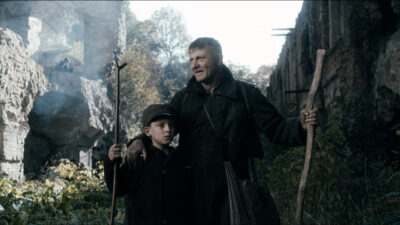
Here’s the official website: STAND WITH UKRAINE THROUGH FILM
Here is a message from the director that will precede the screenings:
Here is the film’s trailer:
Brevity is the soul of wit: The 2022 Oscar-nominated short films are now playing everywhere.
This Friday we’ll expand our screenings of the 2022 Oscar-nominated short films — live action, animated and documentary — to almost all our venues so cinephiles from throughout L.A. County and beyond can enjoy them theatrically. Robert Abele of the L.A. Times weighed in on his favorites:
Documentaries: “The Queen of Basketball is a joyous portrait of college legend, breakthrough Olympian, and only ever female NBA draftee Lusia “Lucy” Harris, a gifted athlete without a professional league of her own. Harris died in January, but here she’s a wry chronicler of her underappreciated majesty, making Queen a fitting film obituary. Matt Ogens’ percussively energized, heartfelt Audible takes us into the tightknit huddle of high schoolers in the successful football program at the Maryland School for the Deaf, their Big Game preparation a poignant metaphor for the feelings of pride, loss and community that make them different from, but also no different than, any teenager facing an uncertain world…Looking back on a childhood choice (and seizing on a wild coincidence) is the province of veteran experimental filmmaker Jay Rosenblatt’s When We Were Bullies, a wonderfully intimate, collage-styled reckoning with memory, hurt and the ethics of storytelling.”
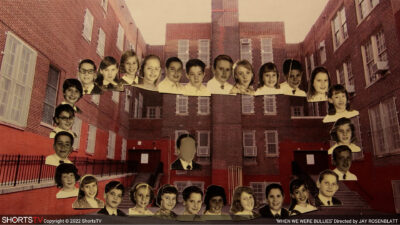
Live action: “The nerviest conscience buster is Aneil Karia’s The Long Goodbye, a companion film to actor/rapper Riz Ahmed’s same-named album. He plays one of many members of a large British-South Asian family in a bustling house preparing for a wedding until a violent reality intrudes, leading to a wall-breaking rap about race, history and nationalism that Ahmed delivers like a frontline soliloquy. On the more Black Mirror end of things is KD Davila’s Kafkaesque satire Please Hold, which fuses our blind fascination with all things contactless, online and privatized with our inability to reform a byzantine justice system, following it to a not-too-far-off conclusion for someone like innocent Latino 20-something Mateo (Erick Lopez).”

Animation: “Lives marred by cruelty factor into the hand-drawn Boxballet and stop-motion Bestia. The former, from Anton Dyakov, brings together a hulking, banged-up pugilist and an up-and-coming ballerina for a wordless-but-not-soundless meeting of sensitive souls. The latter is Chilean animator Hugo Covarrubias’ slow-burning, textural glimpse — set during the country’s military dictatorship — of the corrosive duality in a policewoman’s daily life with her dog, her body and her demons. The eerie airlessness of the dollhouse-like settings and the porcelain shine on the puppets are memorably unsettling.’

“Influential designer/animator Alberto Mielgo, who sparked the aesthetic of Into the Spider-Verse, is another wizard with texture and visual depth. His meditative The Windshield Wiper poses the question “What is love?” to a man in a café, then seeks clues in a series of vignettes with couples around the world. Mielgo’s urbanized hybrid of the painterly and the digitized is hypnotic and its own example of an artist’s love.’

“British animator Joanna Quinn’s enthusiasm for the wiggly expressiveness of traditional animation, meanwhile, makes her latest romp starring middle-aged feminist factory worker Beryl, Affairs of the Art, a raucous delight. (The last Beryl short was in 2006.) Now hellbent on becoming a “hyperfuturist artiste,” drawing-obsessed Beryl (voiced as ever by Menna Trussler) relays a family history of sibling rivalry, imperiled pets, morbid curiosities and eccentric tastes, while Quinn’s masterful caricatures and love of bulbous bodies in motion would make Da Vinci blush, laugh and be jealous simultaneously. Drawing becomes riotously, beautifully alive in Quinn’s vaudeville of aging and anatomy, but so does the wonderfully personal message delivered through her never-too-late-to-try heroine: There’s power in passion, whenever it strikes you in life.”

Please note that the animated shorts are not MPAA rated but if they were they’d likely receive an R or NC-17 rating. Only adults will be admitted.
The Top Ten Films of 2021 contest results are in.
“Beautiful…timely” new documentary about Laemmle Theatres ‘Only in Theatres’ premieres at the Santa Barbara International Film Festival.
The new documentary about Laemmle Theatres, ONLY IN THEATERS, was begun just before the pandemic began and completed last year. It recounts the company’s history and features interviews with all the surviving players as they face the seismic changes in the film exhibition industry. The family members behind this multigenerational business—whose sole mission has been to support the art of film—remain determined to see it survive, despite enormous challenges. From the festival program:
“Laemmle Theaters, the beloved L.A. art house cinema chain, has an astonishing legacy with ties to the origins of Hollywood. This is a story about a family business and their determination to survive in the face of headlines that question the future of movie theaters. For more than 84 years and through three generations, this family’s personal mission has been to elevate the art of films and the artists who make them.”
ONLY IN THEATRES premieres this Saturday night at the prestigious Santa Barbara International Film Festival. There is a second screening on Monday, March 7. Programming Director Claudia Puig was quoted in the L.A. Times today calling it “a beautiful film, and a timely one.”
Follow the film on Facebook for updates on future screenings at https://www.facebook.com/onlyintheaters and check out the trailer:
Moviegoing safely.
- « Previous Page
- 1
- …
- 17
- 18
- 19
- 20
- 21
- …
- 73
- Next Page »

